Looking to get fit in 2020? The best fitness tracker (aka a fitness band, aka "those things you wear that count your steps") is a decent place to start, especially if you're trying to stick to New Year resolutions, even though it’s only autumn. Fitness trackers are not expensive but the best Black Friday deals and best Cyber Monday deals.
• Shop the best cheap Fitbit deals on right now.
With the market extremely well established there really is something for everyone in terms of prices, from around £20 to £200+, with products that do little more than count steps and 'track sleep', with varying degrees of inaccuracy, all the way up to devices with heart-rate tracking that are more like scaled down running watches.
After many years of doing very little beyond counting steps, makers of trackers and bands are now realising that many consumers want more useful feedback on how fit they are and how to get fitter. They are addressing this with, it must be said, 'varying' degrees of success. Or, if you're less diplomatic, not much success.
To cut a long story short, if you're interested in fitness, my strong advice is to get a running watch instead. The term 'running watch' is just shorthand - they're fitness watches that also useful when cycling, hiking, at the gym and even, in a few cases, swimming.
However, if you must have a Fitbit or similar, get the new or one of their more versatile watches such as the Versa 2.
But what is the best fitness tracker?
Okay, it's a Fitbit. Quite hard deciding which, as they are so similar in terms of functionality but at present we rank them like this:
: best fitness tracker overall. Finally, Fitbit has given runners, HIIT workout heroes and anyone who likes more intense exercise what they want. There's GPS to track outdoor activity, improved pulse monitoring accuracy and a new points system that rewards SWEAT.
best fitness tracker with smartwatch elements. With fairly good pulse tracking, Alexa, and an excellent app, this is a good fitness band made just big enough to incorporate a smartwatch-style screen and functionality. No GPS built in but you can tap into your phone's.
: best cheap fitness tracker and easily good enough for most people.
Garmin Vivoactive 4: best fitness tracker made by someone other than Fitbit. with built-in GPS, tracking of more intense workouts and impressive accuracy, this is obviously the device that the Charge 4 was built to take on. The look and feel of it, plus the social and app elements are a bit crappier, however.
Fitbit's app, social network and general ecosystem are just by far the best. Seriously, it's not even close. Garmin's new, tightened-up app is a step in the right direction in some ways, but it's still too sprawling, because it's designed to be for everyone from 10,000-steps-per-day mums to elite triathletes.
One outlier here is the , which features useful audio coaching and long battery life, but is feeling its age a bit now.
Fitness trackers: what you need to know
So, walking 10,000 steps per day is absolutely better than walking none, but it won't turn you into Sir Mo Farah.
Tracking your sleep may give you some interesting insights, but it won't necessarily help you sleep any better. I've tried to address those shortcomings by picking out the bands that try to do more, rather than just literally being step counters.
Fitness trackers have issues around accurately calculating how many calories you've burned, how much distance you've covered and what your heart rate is, particularly during vigorous exercise.
Perhaps worst of all, most older fitness trackers made no effort to tell you how fit you are, or offer any ways to get fitter. Brands are finally addressing this, largely through estimating your VO2 Max during regular workouts. This gives you a base score for how fit you are, which can be rewarding or terrifying, depending on where you sit on the scale.
The best fitness trackers to buy today, in order
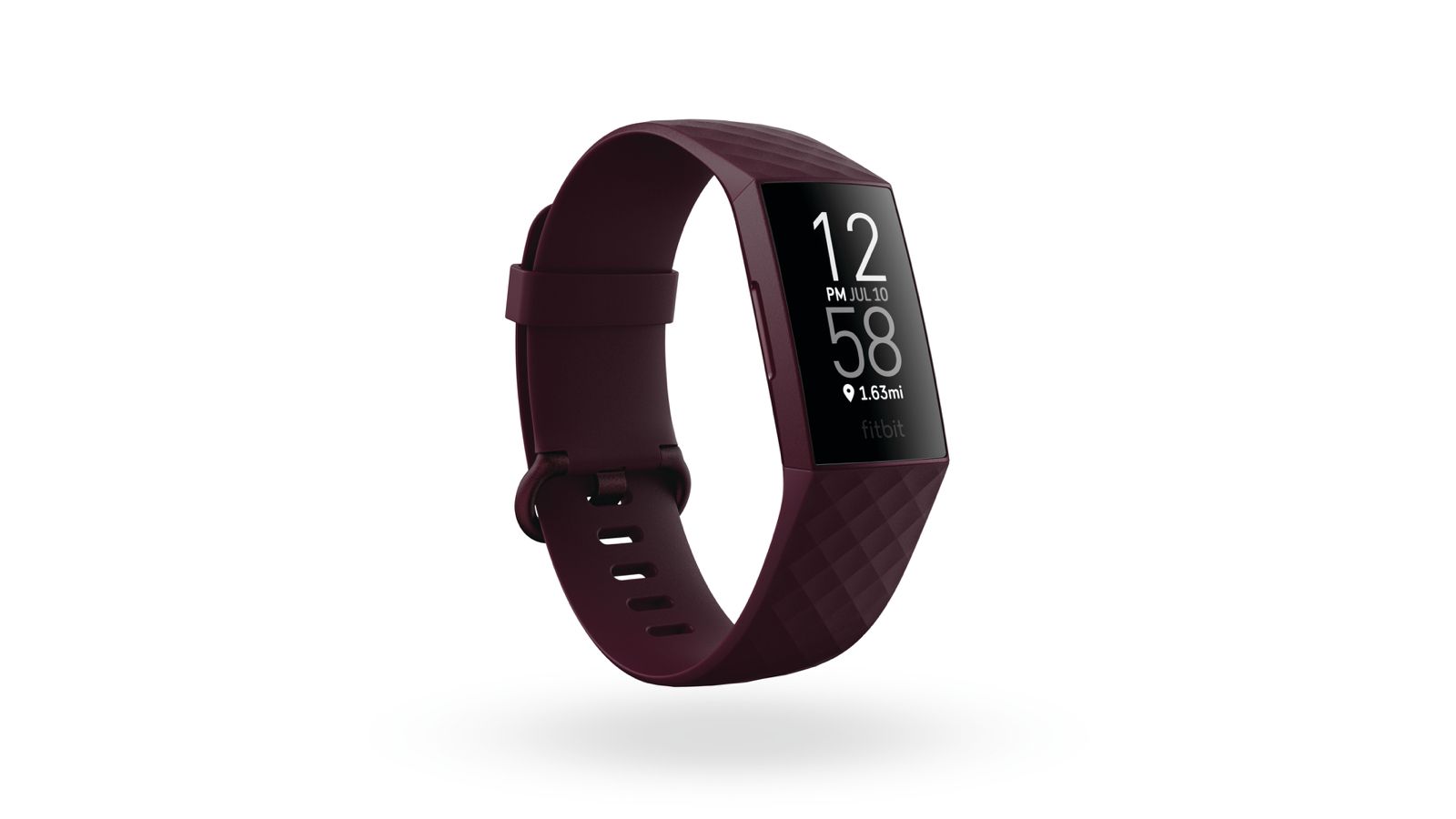
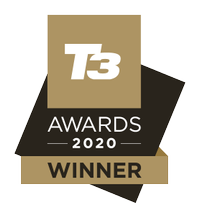
(Image credit: Fitbit)
1. Fitbit Charge 4
The best fitness tracker
Specifications
Battery life: 7 days
Heart-rate monitoring: Yes
GPS: Yes
Reasons to buy
+GPS and Active Zone Minutes give it a more serious air than previous Fitbits+Excellent app+Good for multiple sports+Decent heart-rate tracking
Reasons to avoid
-Mildly annoying capacitive 'button'
The Fitbit Charge 4 is the best fitness tracker you can buy and a big step forward for Fitbit. Admittedly that step forward feels a little late, as it's only now adding features that users have begged for, for years and which Garmin has also offered in its fitness trackers for years. But then, God keeps a special place in Heaven for late converts to the path of righteousness. So thank you, Fitbit.
Most significantly, Fitbit Charge 4 includes GPS for tracking runs, rides, hikes and egg-and-spoon races. And second most significantly, there is a new system for tracking intense exercise, which sits alongside the usual Fitbit fare of counting your steps.
The GPS can take a while to acquire a satellite lock – although to be fair I do usually start running in something of a GPS blackspot – but once it's in business the accuracy of it is very good. It's up there with expensive Garmin watches, in fact.
The heart rate tracking is also not bad, once you figure out the best place to wear it – usually this seems to be just a little further up the arm than you'd expect, in my case. It's certainly good enough for running although if you want to start doing push-ups and pull-ups, it really struggles to keep reading your pulse reliably. This is true of all wrist heart rate trackers but the Charge 4 seems to struggle more than most, and I can only assume that's just down to it being physically smaller and narrower.
The Active Zone Minutes feature gives you a daily and weekly score for activity above and beyond going for a walk. This is exclusive to the Charge 4, which is a little surprising. Other devices continue to use the ostensibly similar but actually somewhat more primitive 'activity minutes'.
Also exclusive to the Charge 4 is that it will automatically choose your heart rate zones for you, based on your age and what it perceives as your fitness level. This should become more accurate, the longer you use the Charge 4.
With your heart rate zones established, Active Zone Minutes works quite well. It scores you one point for every minute spent in the 'fat burn' zone and two points for every minute in the more intense 'cardio' and 'peak' zones. So the longer and harder you workout, the more points you earn.
This also means you can go for a leisurely walk that lasts for 17 hours and you will, in all likelihood, earn ZERO Active Zone Minutes points. Although of course you will tot up lots of steps, as the Charge 4 has not ditched more gentle metrics such as steps, calories burned and estimated distance travelled.
Personally, I find Active Zone Minutes far more useful. Yes, it is pretty much exactly the same system that Garmin has used for years, but Fitbit's devices and app are just more enjoyable to use than Garmin's. And imitation is flattery, right?
If you're into sleep tracking (why?!) the Charge 4 is also very well endowed with features. An overall 'sleep score' attempts to rate your night's efforts at dozing, and those with a Fitbit Premium account can see a detailed breakdown of how long they spent in the various stages of slumber, from light to deep to REM to, er, awake. So that's nice.
Perhaps more useful is a blood oxygen tracking feature that could alert you to health issues such as sleep apnoea. The Charge 4 is not a medical device so it won't literally 'alert' you via any messaging. However, if you look at your nightly blood OX graph and note wild variations in its level, this could mean it's time to see the doctor.
Not everything about Fitbit's attempt to marry its new, more serious approach to it's long-standing quest to count all of the world's steps works. And serious runners and cyclists are still better off with a more serious watch, probably from Garmin. There are however a lot of people in the middle of the step-counting audience and the marathon-running one, and Charge 4 caters for them very well, at a more than reasonable price.
And that is why the Charge 4 has scooped the Best Fitness Tracker prize at the T3 Awards 2020.
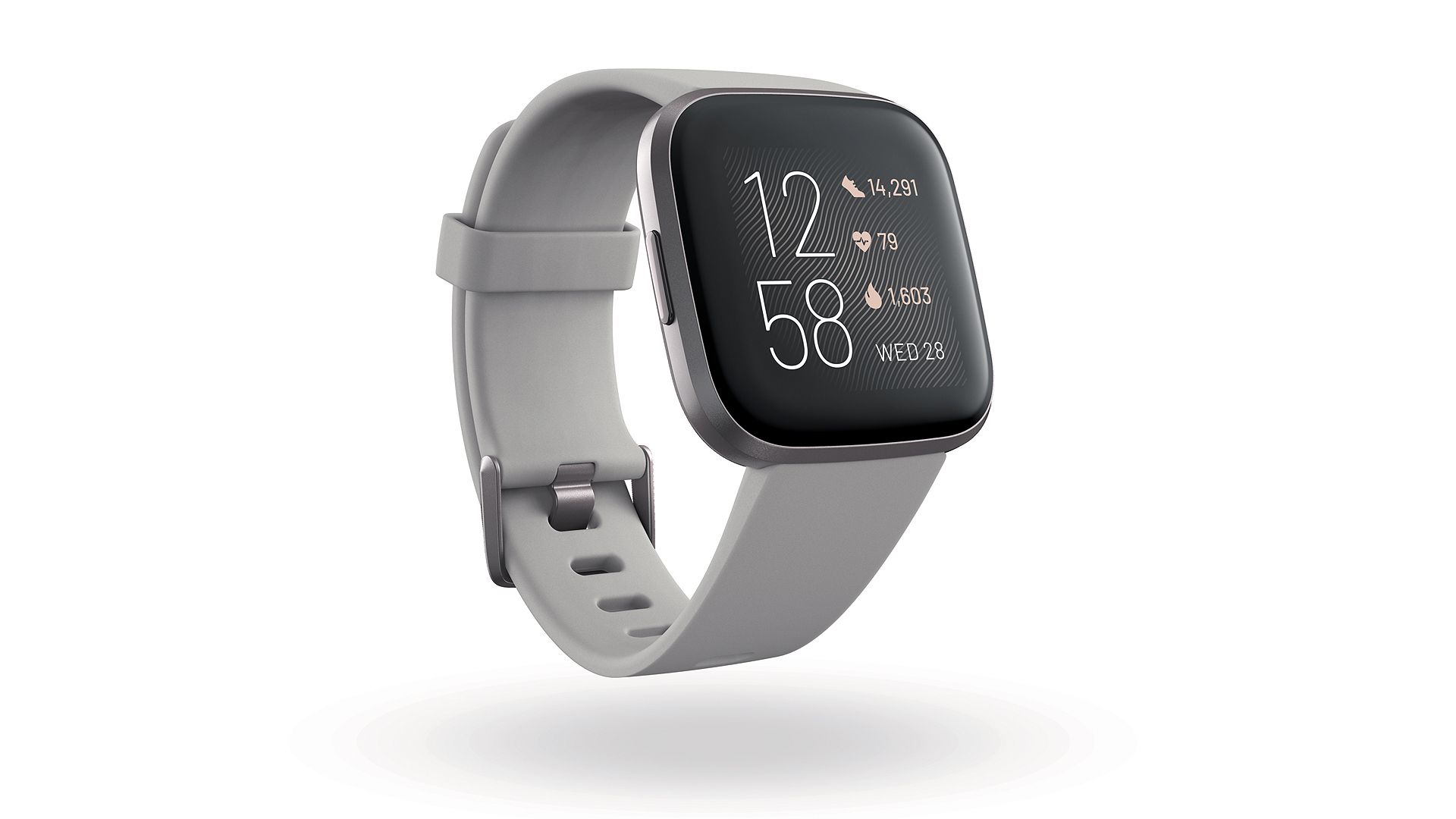
Fitbit Versa 2: head of the Versa family
(Image credit: Fitbit)
2. Fitbit Versa 2
The best fitness tracker/smartwatch hybrid
Specifications
Battery life: 6 days
Heart-rate monitoring: Yes
GPS: via linked phone
Reasons to buy
+Excellent app+Good for multiple sports+Decent heart-rate reader+Gives overall fitness score
Reasons to avoid
-No built-in GPS
The Fitbit Versa 2 is the best fitness tracker cum smartwatch you can buy. It has Alexa built in, its heart-beat and steps counting are reasonably accurate and it's been well designed in terms of looks and usability.
It tracks deep and light sleep, steps, distance and calories, but that is barely scraping the surface of its capabilities. Via Fitbit's excellently presented app and sprawling ecosystem, you can use it as the basis of a complete fitness and diet programme. Unlike all too many competitors, it syncs quickly and reliably too.
Numerous targets and goals can be set (steps, stairs climbed, 'Activity Minutes' of moderate to vigorous exercise, weekly goals for number of days hitting the Activity Minutes target, and so on. You can also enter your meals to log calories consumed, and trade them off against the Charge 3's estimate of how many calories you've burned. I would not trust this, personally, but it's a semi-useful rough guide, I guess.
Thanks to an acceptably accurate and reliable heart-rate reader, it's more useful for serious exercise than many bands.
This is undermined by the fact that the screen turns itself off after just a few seconds, to preserve battery, and the fact that your current cardio zone is not shown on screen. As someone who uses cardio zones as the basis of practically all exercise I do, I find this absolutely baffling. Yes, in theory, you can turn the screen on by turning your wrist but this only works about half the time, and if you're really going for it on a run, cycle or gym session, that is a massive PITA.
A more agreeable feature of the Fitbit Versa 2 is that it can auto-detect various common types of exercise, so you don't have to remember to press a button every time you go for a jog or get on your bike, or an elliptical trainer.
Fitbit's band can also tap into your phone's GPS and function as a running/cycling watch, giving reasonably accurate speed and distance stats, albeit at the cost of draining your phone's battery. Many runners, I know, prefer to leave their phones behind, so they're out of luck with the Charge 3.
This aside, the best thing about the Versa 2 is that it tries to tell you that you've got fitter, via its overall fitness score – mysteriously buried in the 'heart rate' part of the app dashboard. This uses analysis of your heart during very vigorous exercise (it's a VO2 Max estimate, if you want to get technical about it), to rate you against the population as a whole. I'm 'Excellent' thanks for asking.
On the down side, the Versa Lite can't really give recommendations on how to get fitter, beyond taking more steps, although a more in-depth analysis of how to make a better you is promised via future software updates.
I have reservations about the Versa 2 personally – it just looks a bit stupid on my wrist; it's more for more petite blokes and ladies, really – and the small touchscreen is not the easiest thing to navigate, especially as I'm used to massive, chunky running watches with multiple, prominent buttons. It is noticeably better looking than the original Versa, however (see below)
With its low cost, friendly app, long battery life and tracking that goes beyond steps and hours of sleep it's the best tracker for most people. It's also waterproof and can track swims and has some apps, including a contactless payment one – alas, Fitbit Pay is only compatible with a tiny number of UK banks, so this is not as handy as it sounds. Alexa works very well although the mics do require you to speak quite loudly and clearly. She responds via text on the screen only, which is a surprisingly enjoyable way of using Alexa.
Fitbit Versa and Versa Lite
The older Versa (mark one) and Versa Lite are older, cheaper versions of Versa 2. The Versa is all but identical to Versa 2, with NFC for contactless payments (although Fitbit Pay is, to put it mildly, a bit of a work in progress in terms of support), swim tracking, and a couple of extra buttons, but no Alexa. If they're on sale, they are well worth considering.
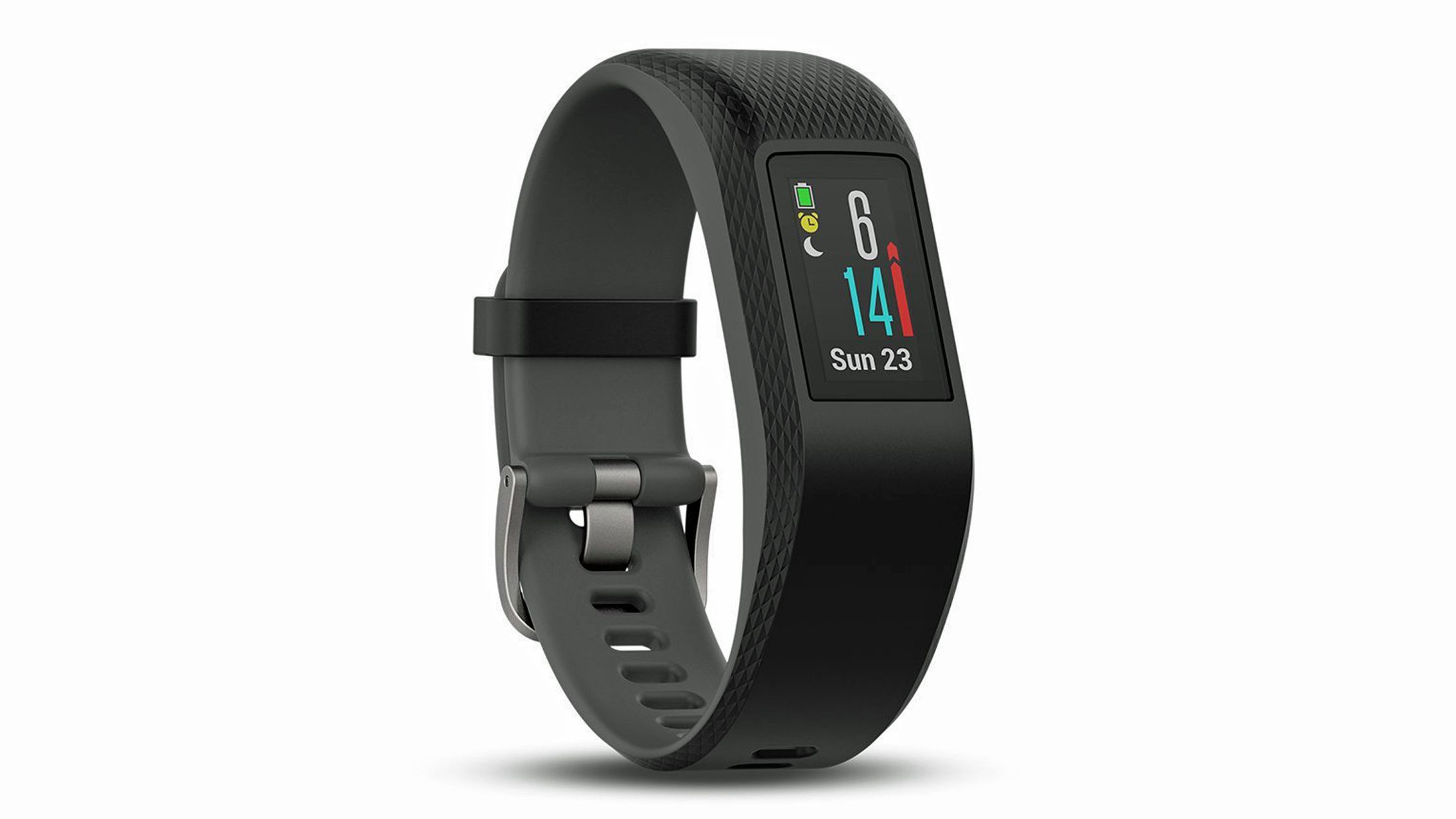
3. Garmin Vivosport
Best fitness tracker with built-in GPS
Specifications
Battery life: 7 days
Heart-rate monitoring: Yes
GPS: Yes
Reasons to buy
+Long battery life+GPS and HR built in+Waterproof
Reasons to avoid
-Dodgy UI and app-Crappy additional features
This is an object lesson in how software and wearability are as important to fitness wearables as features are. Perhaps more so.
And the reason I say that is as the Vivosport beats the Charge 2 by having GPS built in, an app for counting reps automatically at the gym, something to monitor your stress levels, you might think it's a better product. And it is, on paper.
However, although the Vivosport is a very solid performer, it's just kind of horrible to wear. It feels nasty, looks quite bad, I think, and the screen is even worse to look at than the Charge 2, due to a stupid layout.
When you go into Garmin's app, it's also much more fiddly than the Fitbit one. The same metrics are there, and more beside, but they're harder to find and use. Syncing is unacceptably painful at times.
All that said, if you can live with the Vivosport's aesthetic and UI issues, it does do a lot and, like the Charge 2, offers an estimated VO2 Max score and rating that you can use to gauge your overall fitness.
Sleep monitoring is perhaps a bit less detailed than Fitbit's but lovers of completely useless functions will be pleased to know that there is advanced stress monitoring on board. Who doesn't know when they're stressed?!
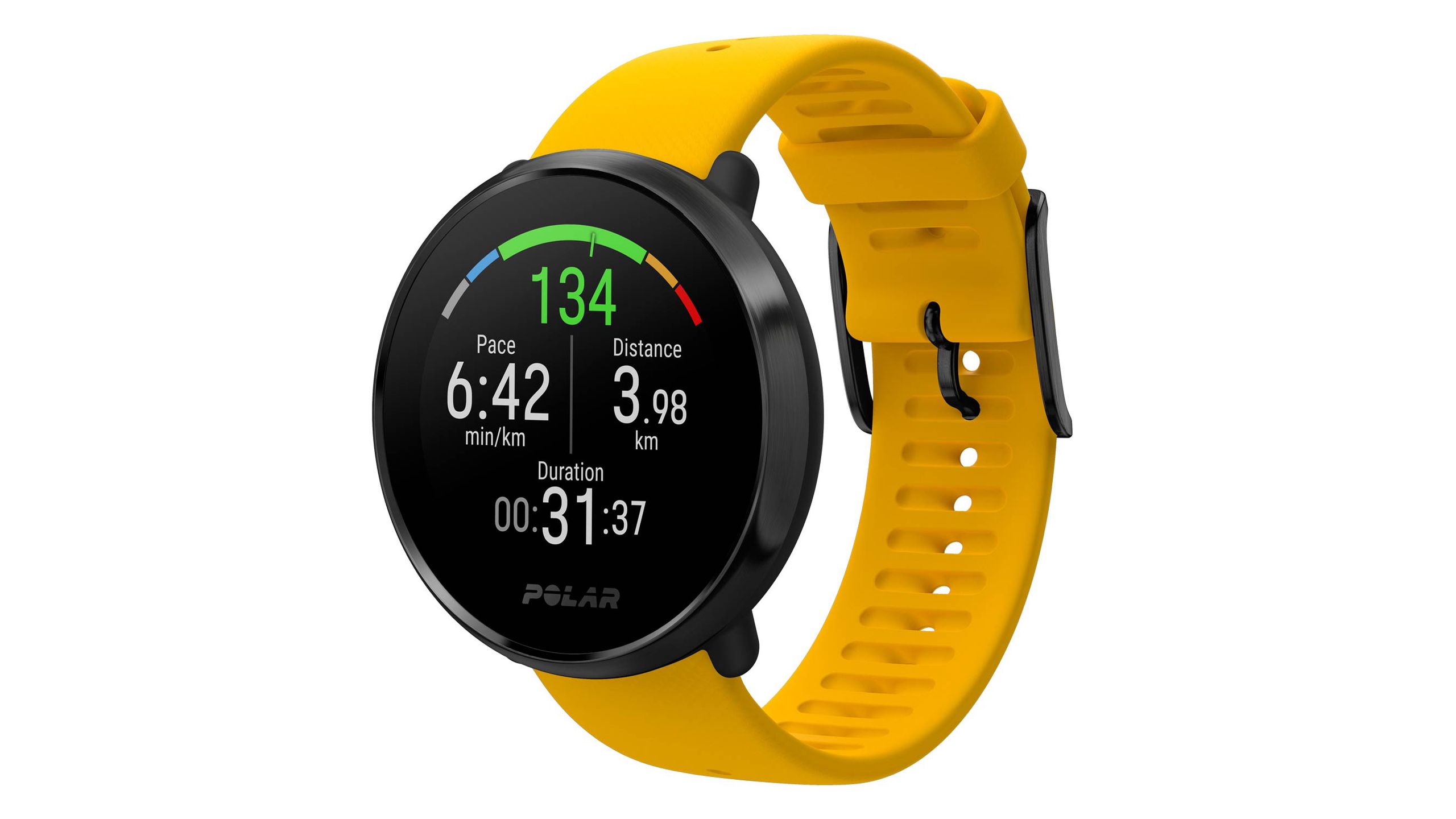
(Image credit: Polar)
4. Polar Ignite
Adaptive trainer with great accuracy
Reasons to buy
+Great app+Integrated GPS+Useful sleep and training insights+Continuous HR tracking
Reasons to avoid
-No NFC or music storage-Too bulky to wear it during the night
The Polar Ignite is a great fitness tracker, mainly aimed at runners, but it can track a million other fitness activities like backcountry skiing fitness dancing too. As well as tracking your activities, it can also monitor sleep and keep an eye out on your heart-rate throughout the day too.
Thanks to the built-in GPS, there is no need to carry around the phone with you when you go out for a run to be able to track your course. Recording an exercise is as easy as pressing the button on the side and tapping on the icon of the desired activity, doesn't take you more than two seconds.
Wrist-based HR trackers aren't the most precise but the Polar Ignite does a good job to give you an estimate, based on your fitness levels, age, sex, etc. It can also measure VO2 Max with the 'Fitness Test' feature.
The metrics monitored by the Polar Ignite are more than enough for most serious amateurs, people this fitness watch was designed for. Not only it gives you stats after the exercise has been finished on the watch face, once synchronised with the Polar Flow app, you can analyse your training in even more depth.
You can also track your sleeps with the Polar Ignite. The only issue is – and this is something all fitness trackers have in common – is that wearing a tracker 'snugly' is not comfortable on the long run.
The Polar Ignite is by no means the cheapest tracker ion this list but given the range of features, it's a worthwhile incestment.
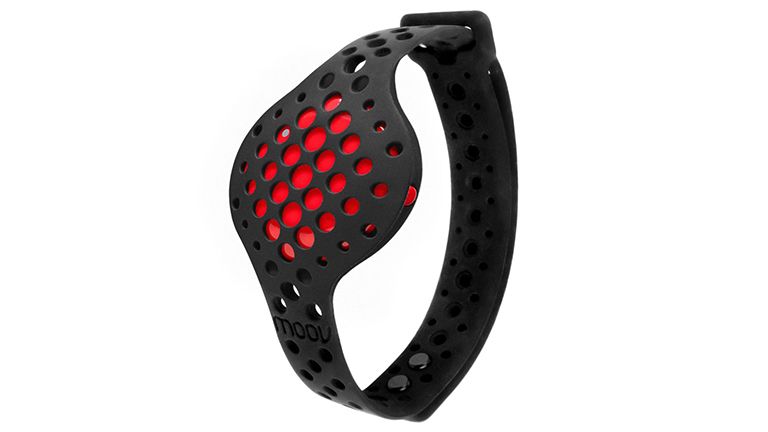
5. Moov Now
Fitness tracker with voice coaching
Specifications
Battery life: 6 months
Heart-rate monitoring: No
GPS: No
Reasons to buy
+Six-month battery life+Sometimes handy coaching advice+Relatively cheap
Reasons to avoid
-Sometimes not handy coaching advice
Okay, this one doesn't have cardio tracking but it's good enough to merit inclusion nonetheless. That's because, with a six-month battery life from a standard watch battery, waterproofing to 30m, a choice of wrist and ankle straps, and the addition of voice coaching, Moov Now is a very interesting take on fitness wearables.
You'll need your phone and a secondary device to track your position and pulse, but what this lightweight, reasonably priced, quite attractive band adds is to exchange data with a phone app so it can talk you through your runs. It'll tell you when to speed up, give advice on your stride and how hard you're hitting the ground.
It'll also track and, to greater and lesser degrees, coach you through swimming, cycling, running, cardio boxing and seven-minute HIIT workouts.
When we say coaching varies, it really does. Cardio boxing is almost like Guitar Hero but with punching, with lots of voice input. Seven-minute interval workouts come with plenty of motivation too, but cyclists just get vague tips on cadence, and inaccurate data on RPM and power.
Moov Now also handles day-to-day step and sleep tracking. The battery is a standard, non-rechargeable watch type that you can fit and forget about for up to six months – very good.
Overall, Moov is a mixed bag, but at least it's trying. For the price, it's worth a try.
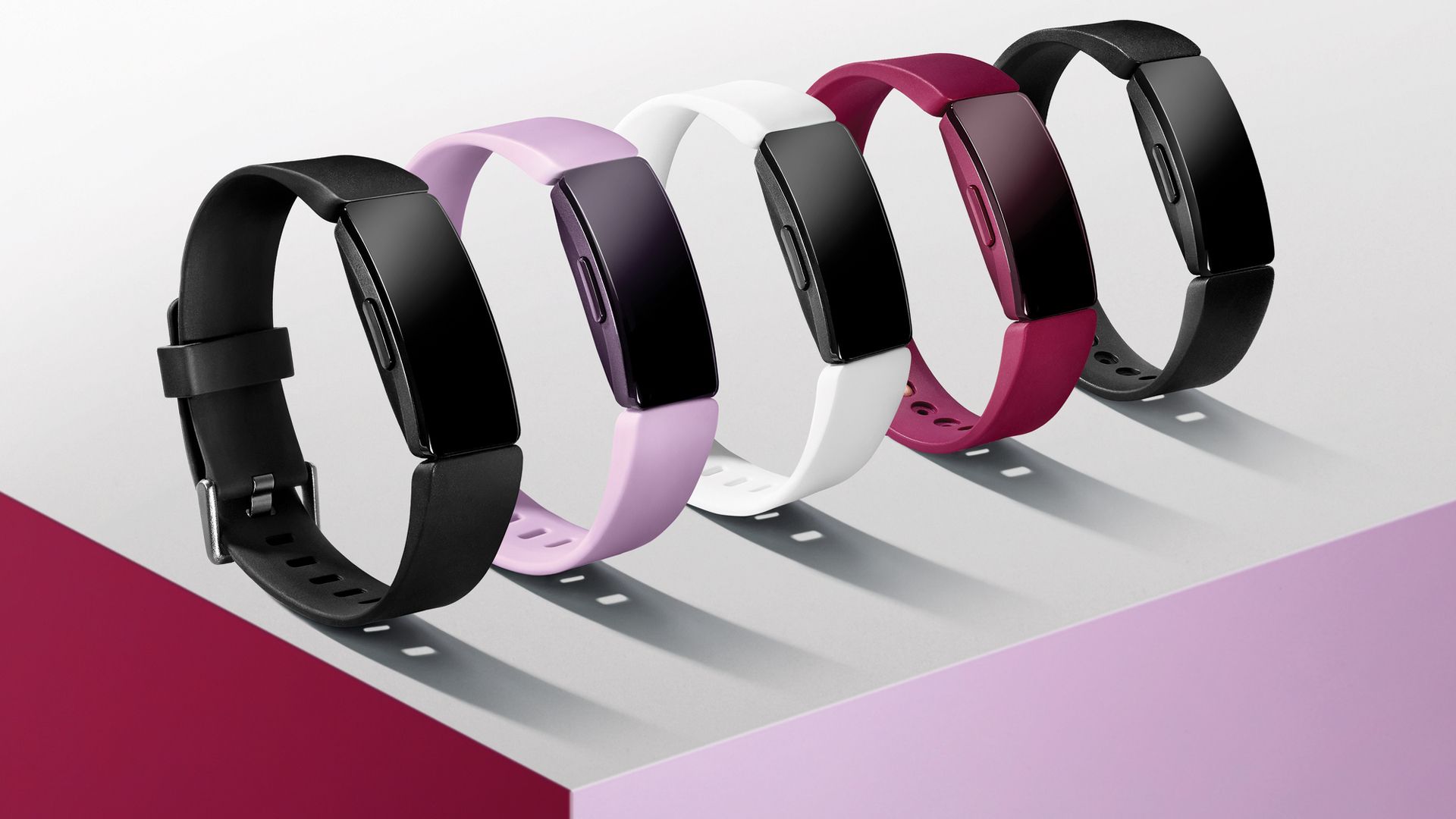
6. Fitbit Inspire HR
Best cheaper Fitbit
Specifications
Battery life: 5 days
Heart-rate monitoring: Yes
GPS: No
Reasons to buy
+Excellent app+Very slim+Lots of functionality
Reasons to avoid
-Pulse tracker not much use for exercise
Functionally all but identical to the Charge 3, but somewhat more compact and aimed more directly at women, the Inspire HR replaced the Alta HR last year.
It's a solid device, in terms of function, although a rather flimsy one in terms of feel – but then it is very slender, and very affordable. Calling it 'Inspire' was pushing it a bit but somehow, you feel that 'Fitbit Workmanlike HR' or 'Adequate HR' don't have quite the same ring to them.
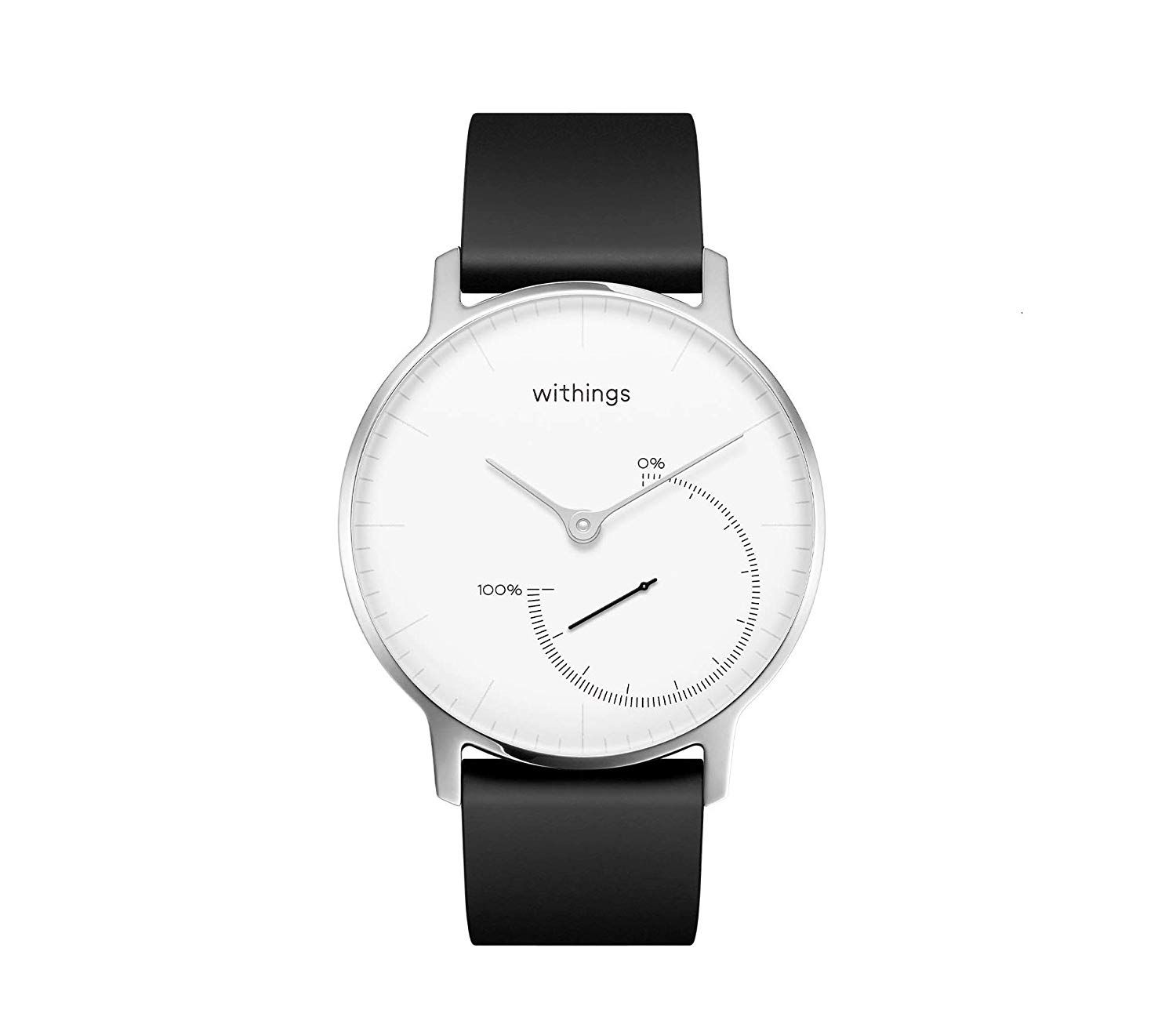
(Image credit: Withings)
7. Withings Steel
The best of the hybrid watch fitness trackers
Specifications
Battery life: 6 months
Heart-rate monitoring: No
GPS: No
Reasons to buy
+The best-looking step counter+Inviting, if detail-lacking app+Handy vibro-alarm function
Reasons to avoid
-Doesn't really do much
The Withings Activité started the trend for analogue watches that also track steps and sleep. It was such a huge success that Withings eventually became part of Nokia, and its successor, the Nokia Steel, is still pretty good.
At a glance, this just looks like a Swatch-esque watch, but the small secondary dial measures your progress towards your step goal throughout the day. The Steel will also detect when you're running or swimming and gamely attempt to track that. This makes a distance calculation based on steps/strokes taken rather than GPS, but it isn't totally inaccurate, all the time. The Nokia Steel will also have a loose stab at tracking your sleep (based on your movement as you slumber) and has a useful vibro-alarm function to then wake you up.
The Nokia app is user-friendly enough, although data is annoyingly slow to sync at times. There's not much to view on it – just steps, distance and calories burned (although I'd take all that data with a pinch of not-very-healthy salt). You can add other Nokia/Withings products such as its body scales, to add further metrics.
In truth, the best things about the Steel are that it doesn't look like a fitness band, and the standard watch battery it uses lasts an impressive six months.
If you find the Steel a bit cheap looking there are still stocks of the old, range-topping Withings Activité available. This really oozes quality with a soft leather strap, domed sapphire glass and stainless steel casing, but it had/has all manner of reliability and syncing issues.
The more functional adds heart rate monitoring and smartphone notification features to the Steel. For an extra £50.
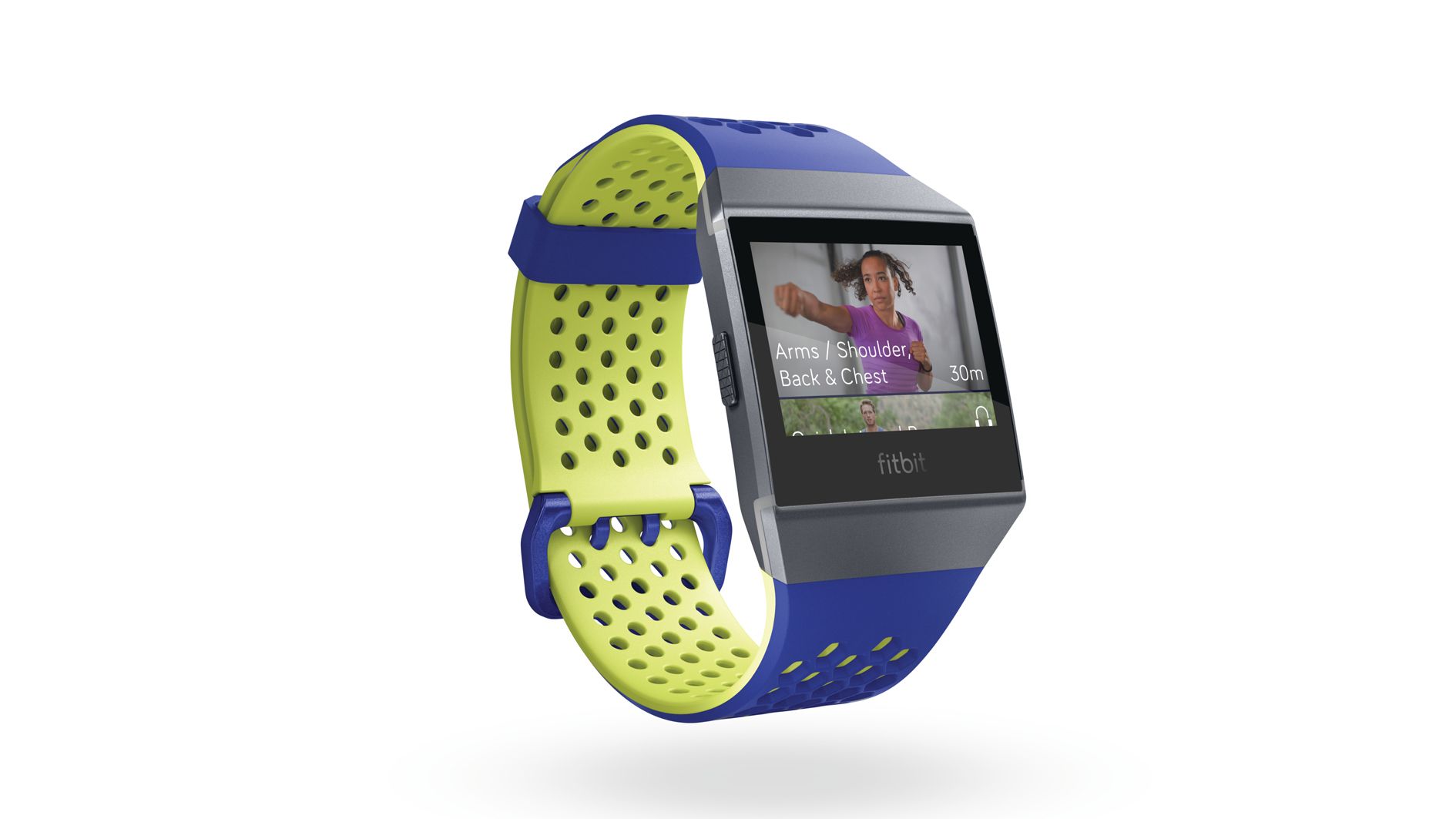
8. Fitbit Ionic
Best Fitbit for runners and cyclists – more of a tracker/running watch/smartwatch hybrid
Specifications
Battery life: 4 days
Heart-rate monitoring: Yes
GPS: Yes
Reasons to buy
+Good app, great screen+Very full feature list+Guided workouts have potential+Smartwatch-style extras
Reasons to avoid
-Pulse tracking issues-Few apps to date
All the Fitbits and Garmins have a stab at notifications, but the Ionic is the first such watch that is being marketed more as a smartwatch with fitness elements than a fitness band with smartwatch ones. It's a platform, man.
The Ionic has all the strengths of the Charge 2, but with a much better screen, video-assisted guided workouts, and the ability to make contactless payments, receive notifications and use third-party apps. It is quite a bit pricier as a result, however.
To date there are hardly any third-party apps (you can sync Deezer playlists, there's a slightly feeble shadow version of Strava and something for buying coffee from Starbucks). Contactless payments are fairly painless, but you need to enter a PIN once or twice per day on the Ionic's teeny tiny keypad.
There are also only three video workouts. Fitbit I am sure wants to expand this but I do question the usefulness of wrist-mounted, video personal training – have you ever tried to follow a training video on your wrist, whilst doing pressups?
My main problem with the Ionic to date has been with the heart rate tracker, which has apparently been optimised for more intense exercise. I think that's great in theory, but in practice it seems to mean it's highly erratic in the lower cardio zones, and only starts to work really well once your heart-rate is elevated into the upper cardio, performance and peak zones. That's not ideal if you want to deliberately stick to a lower intensity workout, for fat-burning reasons.
Furthermore, Fitbit still refuses to show what heart-rate zone you're in during training; it only shows the pulse rate, leaving you to remember where each zone begins and ends. At least, unlike the Charge 2, the Ionic allows you to have the screen permanently on, rather than requiring you to flick your wrist to activate it – an action which fails all too often, for me.
Ionic is only going to get better as time goes by, and the Fitbit app does everything from telling you how many steps you've taken to tracking your latest running/cycling/gymming/etc to how your VO2 Max compares to the population at large.
Actually, I'm nitpicking in some respects. The Ionic is a very good fitness wearable. It's just that, if you want a smartwatch that also tracks fitness, I think you'd be better off with an Apple Watch, and if you want a 24/7 tracker, Fitbit's own Charge HR is a better option.
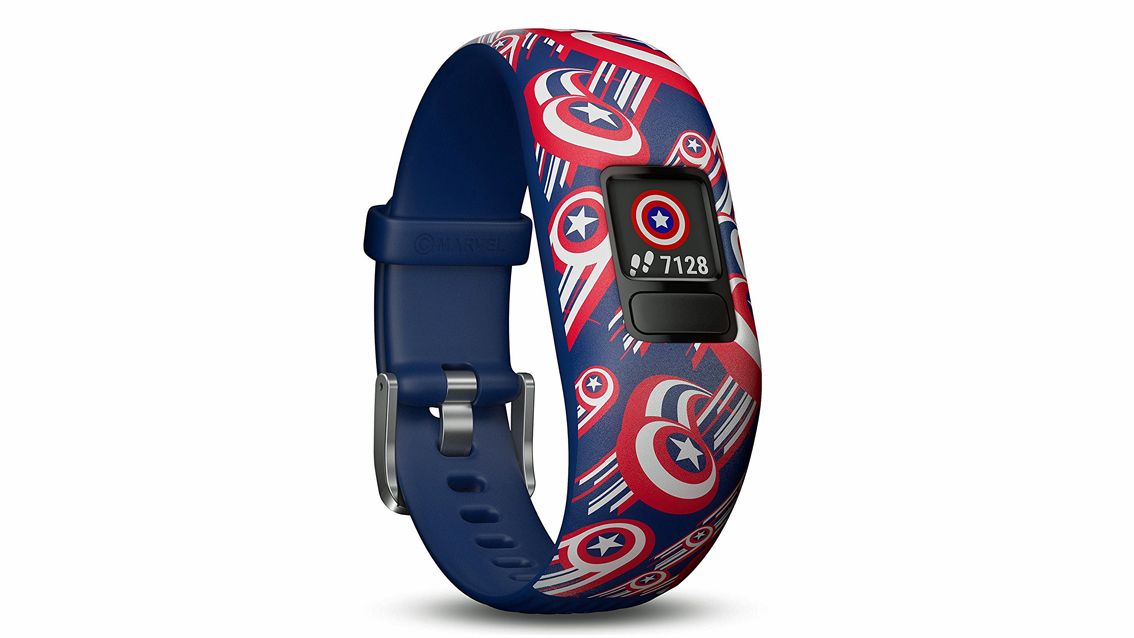
9. Garmin Vivofit JR 2
Best fitness tracker for kids
Specifications
Battery life: '1+ years'
Heart-rate monitoring: No
GPS: No
Reasons to buy
+Long battery life+Kids love it+Disney/Marvel/Star Wars designs
Reasons to avoid
-Doesn't do a huge amount
Being narcissists, kids love any information they can get about themselves, so a step counter specifically for kids makes a lot of sense.
Garmin's scaled down Vivofit comes in all manner of themed designs, from Minnie Mouse to Captain America, and rewards the wearer for completing 60 minutes of activity per day by allowing them to progress through a game related to the theme – Ultron's Revenge for the Captain America one, for instance.
You can also set up alerts and 'chore management' for your offspring. The latter is more fun than it sounds. You can allot points for doing certain chores or activities that build up over time until preset (by you) goals are reached, at which stage, they get to go to McDonald's or whatever.
The strap is maybe a bit big for younger/smaller children but it is robust, and makes Vivofit JR 2 hard to lose. The watch is waterproof, and the battery should last for over a year before needing replacement. If your 7-year-old is still into it after 12 months, that would be a minor miracle, of course.
I do think it's quite funny that a goal of 60 minutes of activity has been added to this as standard, whereas it's seemingly deemed too much for mere adults.
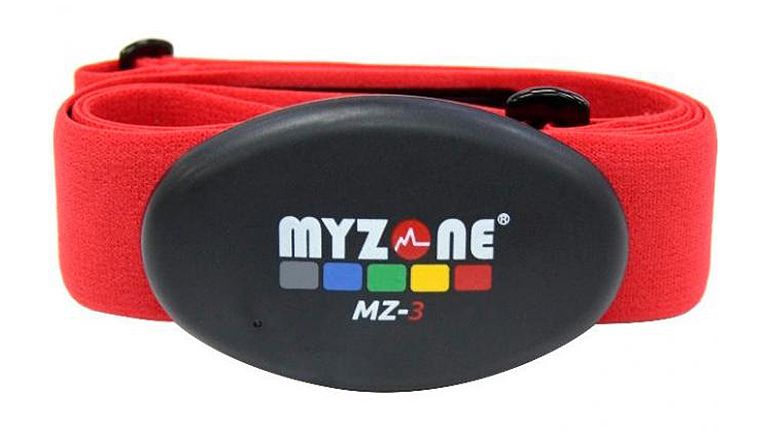
10. Myzone MZ-3
Best fitness tracker for competitive gym bunnies
Specifications
Battery life: 6 months
Heart-rate monitoring: Yes
GPS: Yes
Reasons to buy
+Accurate cardio tracking+Good social platform+Long battery life
Reasons to avoid
-Minimal usefulness outside of a gym
This is specifically for 'proper' workouts, rather than step and activity tracking.
In conjunction with its app, Myzone tracks accurately your cardio effort during exercise and allows you to compete via a social platform to find out who is officially the fittest amongst your peer group, with league tables and everything.
Interestingly, because its scoring is based on effort, theoretically it allows unfit people to compete against more advanced athletes. Is that fair, when someone might be so unfit their pulse rate will go through the roof if they so much as look at a skipping rope? We'll leave that for you to decide.
This can't compete with Fitbit, Garmin or even the Microsoft Band when it comes to tracking daily health metrics like steps and hours slept.
However, we'd venture that it's vastly more useful if you want to get properly fit, as opposed to just losing a bit of weight or feeling a little more active. For gym bunnies, it's well worth considering.
Myzone is available as a standalone heart-rate strap and (for and extra £80) as part of this rather fetching compression top. There's also a bra for the ladies.
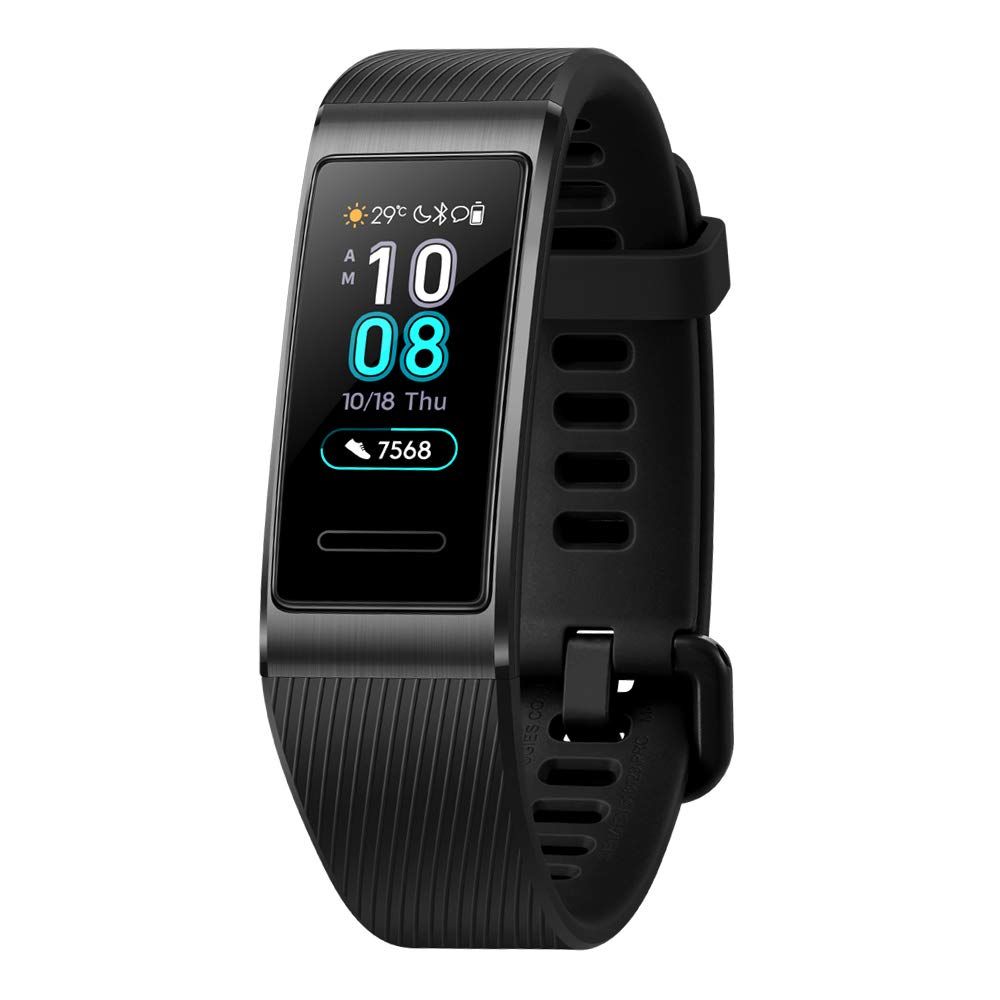
(Image credit: Huawei)
11. Huawei Band 3 Pro
Track and improve your sleep
Specifications
Battery life: up to 12 days
Heart-rate monitoring: Yes
GPS: Built-in
Sleep tracking: : Yes
Reasons to buy
+Built-in GPS+Great price+Accurate sleep tracking
Reasons to avoid
-Screen not big enough for smartphone notifications-GPS isn't the most precise
The Huawei Band 3 Pro delivers on what it promises: an affordable fitness tracker with some bonus features such as built-in GPS and sleep tracking. This sleek little device won't win any design awards for innovation but it is not expected to do so anyway.
The Band 3 Pro's AMOLED touchscreen displays all the essential information, such as heart rate an steps taken, and you can choose to log a wide variety of exercises, including outdoor and indoor cycling and run, pool and open water swim or freeform. Needless to say, the Band 3 Pro is waterproof, otherwise it would be fairly challenging to log exercises in water.
You can check a range of metrics in the Huawei Health app (something you will need to set the band up) including sleep stats. The app can also recommend ways to improve your sleep quality using the TruSleep feature. After the band assessed your baseline (you wore it for three sleeps), this feature can provide you with more than 200 potential solutions and suggestions to help you sleep better and make mornings easier.
"activity" - Google News
November 28, 2020 at 03:43AM
https://ift.tt/39lTkaN
Best fitness tracker for Black Friday: track steps, activity, sleep and cardio - T3
"activity" - Google News
https://ift.tt/3ddCXMh
https://ift.tt/2WkO13c
Bagikan Berita Ini














Kamu suka main p0k3r atau dom1n0? Main disini saja 1onQQ*c0m
ReplyDeleteFair agen, Terpercaya.. Menang pasti kamu dibayar!!
Sedia deposit pulsa juga (min 25rb)